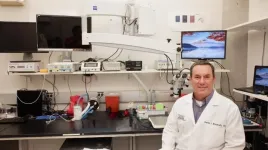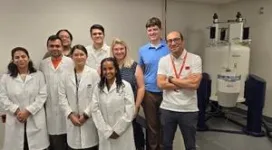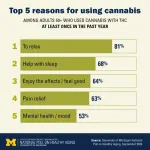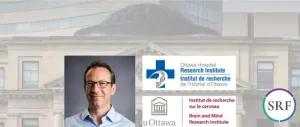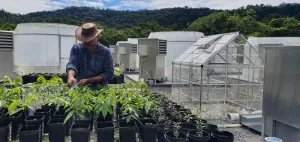(Press-News.org)
After more than a decade of research growth and recruiting efforts to build strong, collaborative research programs, the Jerry H. Hodge School of Pharmacy in Amarillo has developed the Brain Drug Discovery Center, the newest Texas Tech University Health Sciences Center (TTUHSC) research center.
Created from two existing pharmacy school centers — the Center for Blood-Brain Barrier Research and the Cancer Biology Research Center — the Brain Drug Discovery Center will focus on discovering novel drug targets and treatments for a variety of neurodegenerative diseases. To do so, the center will combine the long-standing expertise and blood-brain barrier research from the previous centers with the new faculty researchers hired by the school in the area of brain drug discovery.
Thomas Abbruscato, Ph.D., the Brain Drug Discovery Center’s inaugural director, said the pharmacy school is fortunate that many of its pharmaceutical sciences faculty have research expertise in areas such as brain stroke, neuropathic pain, addiction, cell-based therapies, brain cancer and blood-brain barrier science.
“Several collaborative projects have been supported by the National Institutes of Health, the Cancer Prevention and Research Institute of Texas and the Food and Drug Administration,” Abbruscato said.
Abbruscato said the Brain Drug Discovery Center would not be possible without the support of TTUHSC’s Office of Research and Innovation, the Jerry H. Hodge School of Pharmacy and the Department of Pharmaceutical Sciences faculty and graduate students.
“The Brain Drug Discovery Center will provide an opportunity to build on an already state-of-the-art drug discovery infrastructure and expertise in the School of Pharmacy and the Department of Pharmaceutical Sciences,” Abbruscato said. “The institution has been extremely generous to support this mission.”
One recent example of the School of Pharmacy’s highly developed drug discovery infrastructure is its Nuclear Magnetic Resonance core, which can determine the structure of small molecules, an important step in drug discovery. The school’s Avance Neo 400 MHz NMR Spectrometer Nano was updated in July to enhance the core capabilities in structural elucidation, offering researchers high-resolution data, advanced analysis and cutting-edge technological analytical tools.
The School of Pharmacy also houses a molecular modeling core and a synthetic chemistry core. Both are critical components of the drug discovery process and will play pivotal roles in the Brain Drug Discovery Center, which will unify these cores to engage drug discovery efforts throughout TTUHSC and beyond.
Abbruscato said the center aims to generate and coordinate multidisciplinary efforts in medical chemistry, pharmacology, drug delivery, formulation and drug repurposing in an effort to translate TTUHSC’s basic science into therapeutic intervention for human and animal disease.
“The main emphasis will be on establishing a robust pipeline of collaborative projects with faculty from the TTUHSC School of Pharmacy and School of Medicine and the Texas Tech University School of Veterinary Medicine,” Abbruscato said.
The ability to screen, generate and synthesize novel chemical entities is a complex undertaking that requires multiple researchers. Abbruscato said TTUHSC scientists have engaged in research to identify and validate novel disease targets, though the translation of these findings to interventional therapeutics proves much more challenging.
“The Brain Drug Discovery Center will facilitate the generation of biologically active small molecules to engage a variety of protein targets,” Abbruscato said. “Because it will not be limited to a specified indication, the center will be able to provide expert support for faculty in a breadth of brain disease areas.”
The inaugural Brain Drug Discovery Center members include Abbruscato, Abraham Al-Ahmad, Ph.D., Mahmoud Ahmed, Ph.D., Ulrich Bickel, M.D., Hiranmoy Das, Ph.D., Nadia German, Ph.D., Lance McMahon, Ph.D., Samuel Obeng, Ph.D., Quentin Smith, Ph.D., Heidi Villalba, Ph.D., Ming-Hai Wang, M.D., Ph.D., and Jenny Wilkerson, Ph.D.
“Currently, center members are primarily from the Department of Pharmaceutical Sciences, but we will work to expand membership across departments and schools to form collaborative drug discovery efforts,” Abbruscato said. “We plan to engage multiple stakeholders, including the community, the pharmaceutical industry and the TTUHSC Office of Research and Innovation, to create new partnerships that accelerate the pipeline of medication and diagnostic innovation.”
###
END
A QB3-led team uniting researchers from the University of California campuses at Berkeley, San Francisco, and Santa Cruz was awarded a $12 million grant from the California Institute for Regenerative Medicine (CIRM) to investigate the origins of autism using sophisticated cellular models called “neural organoids.”
This grant is the first funding brought in by QB3’s Collaborative Research initiative, which was recently created to address major challenges in human health by leveraging research talent and resources across the UC campuses served by QB3.
"We are grateful for the support provided by the CIRM team to craft a highly successful application ...
Whether they’re using it for recreational or medical reasons, a sizable percentage of people in their 50s and older have smoked, eaten, drunk or applied to their skin at least one form of cannabis in the past year, a new poll shows.
In all, 21% of people age 50 and older said they used a form of cannabis that contains the psychoactive compound THC at least once in the past year, according to new findings from the University of Michigan National Poll on Healthy Aging. The poll report focuses on use of cannabis ...
Mill Valley, CA – September 12, 2024 – The SynGAP Research Fund 501(c)(3) announces a $128,888 grant to Dr. Baptiste Lacoste at the uOttawa Brain and Mind Research Institute (uOBMRI) and Ottawa Hospital Research Institute (OHRI). This grant supports Dr. Lacoste's pioneering research project aimed at exploring the role of vascular and metabolic dysfunction in SYNGAP1-Related Non-Syndromic Intellectual Disability (SYNGAP1-NSID), also known as SYNGAP1-Related Disorders (SRD).
With elevated energy demands and a limited capacity to store ...
A Scottish $75,000 prize for “radical innovation” has shortlisted four academics from around the world.
Named after Panmure House, the former Edinburgh home of 18th century Scots economist and philosopher Adam Smith, the Panmure House Prize rewards groundbreaking research that contributes to advancing long-term thinking and innovation.
After a record number of entries for the 2024 prize, its fourth year, the judges have drawn up a shortlist of four submissions from the United States, Spain ...
Boston, MA and Rolle, Switzerland, September 12, 2024 – SOPHiA GENETICS (Nasdaq: SOPH), a cloud-native healthcare technology company and a global leader in data-driven medicine, will be presenting multiple posters at the European Society for Medical Oncology (ESMO) Congress 2024 being held in Barcelona, Spain September 13-17, 2024. The ESMO Congress is a globally influential oncology platform for clinicians, researchers, patient advocates, journalists and healthcare industry representatives from all over the world.
The details of the presentations are as follows:
Title: ...
Access VIDEO, photos and captions here
Climate change and asteroids are linked with animal origin and extinction – and plate tectonics also seems to play a key evolutionary role, ‘groundbreaking’ new fossil research reveals.
The discovery of an exceptionally well preserved ancient primitive Devonian coelacanth fish in remote Western Australia has been linked to a period of heightened tectonic activity, or movement in the Earth’s crust, according ...
The personal carbon footprint of the richest people in society is grossly underestimated, both by the rich themselves and by those on middle and lower incomes, no matter which country they come from. At the same time, both the rich and the poor drastically overestimate the carbon footprint of the poorest people.
An international group of researchers, led by the Copenhagen Business School, the University of Basel and the University of Cambridge, surveyed 4,000 people from Denmark, India, Nigeria and the United States about inequality in personal carbon footprints – the total amount of greenhouse gases ...
HOUSTON – (Sept. 12, 2024) – Researchers at Baylor College of Medicine and collaborating institutions have discovered new insights into tumor-induced B cell changes in blood and bone marrow of triple negative breast cancer patients. The findings, published in Nature Cell Biology, show two distinct patterns of B cell abnormalities that could serve as blood biomarkers for determining likelihood of response to standard-of-care chemotherapy and immunotherapy.
“Even with significant advances in immunotherapy, ...
Ehrapy is intended to fill a critical gap in the analysis of health data, says Lukas Heumos, one of the main developers and a scientist at the Institute of Computational Biology at Helmholtz Munich and the Technical University of Munich (TUM): “Until now, there have been no standardized tools for systematically and efficiently analyzing diverse and complex medical data. We’ve changed that with ehrapy.” The team behind ehrapy comes from biomedical research and has extensive experience in analyzing complex scientific datasets. “The healthcare sector faces similar challenges in data analysis as ...
Ozone gas is reducing the growth of tropical forests – leaving an estimated 290 million tonnes of carbon uncaptured each year, new research shows.
The ozone layer in the stratosphere shields our planet from harmful ultraviolet radiation – and protecting it is one of the major successes of environmental action.
But ozone at ground level – formed by the combination of pollutants from human activities in the presence of sunlight – interferes with plants’ ability to absorb carbon dioxide. Ozone is also harmful to human health.
The new study, published in ...
